Poverty wears many faces.
Its complexity makes it difficult to define in simple terms. Yet, stereotypes and misconceptions abound about people who live in poverty and what it means to be “poor.”
Poverty is often the result of a combination of factors largely outside of a person’s control. Poverty is not just a lack of money, but also a lack of choices and access to even the most basic of resources. And the ways in which people experience poverty-related deprivation are as diverse as the people themselves, which makes finding sustainable solutions difficult.
Unbound works to eliminate poverty by empowering the individuals and families in our programs to take the lead in making the decisions that will improve their lives.
One essential method this approach employs is direct cash transfers (DCTs) to deliver economic support to program beneficiaries. This method, coupled with personalized support, is helping Unbound and the families we serve redefine how the world should view poverty and what it will take to eradicate it.
July 11, 2025 | Child Sponsorship
Redefining poverty: Benefits of cash transfers
Trust and personalized resources in the right hands could end global poverty
By Kati Burns Mallows
Why Unbound uses cash transfers to empower people living in poverty
Sometimes [we] feel that we must be marginal, that is, we must continue as we are in precarious conditions. You think, since you arrived that way [was born into poverty], ‘If I am poor, I must continue in misery.'
— Gustavo, Unbound scholarship recipient in Colombia
Redefining poverty begins with trust.
Unbound Chief International Program Officer Dan Pearson said that any serious commitment from the international development sector to empower individuals in poverty must include a focus on who controls decisions and money.
“We wanted to find a system that would commit Unbound to this path of a decentralized approach to development, one that would restrict us from controlling their [families’] decisions,” Pearson said.
The organization has spent over 24 years testing and evaluating direct cash transfers as a method of support that reduces poverty by providing recurring payments to low-income individuals and households.
Unbound began using cash transfers to deliver sponsorship funds to families in its India programs in 2001, and the method eventually expanded to become the standard at all Unbound program sites across 17 countries. Though not a new method of providing humanitarian aid, cash transfer use by development organizations at large scale, across multiple countries and regions, and in small doses over long periods of time is still rare.
In 2024, over 261,000 children, youth and elders were sponsored through Unbound, and the organization sent $82.15 million in direct cash transfers to sponsored members’ bank or mobile money accounts. It’s then up to families to choose what to do with their funds.
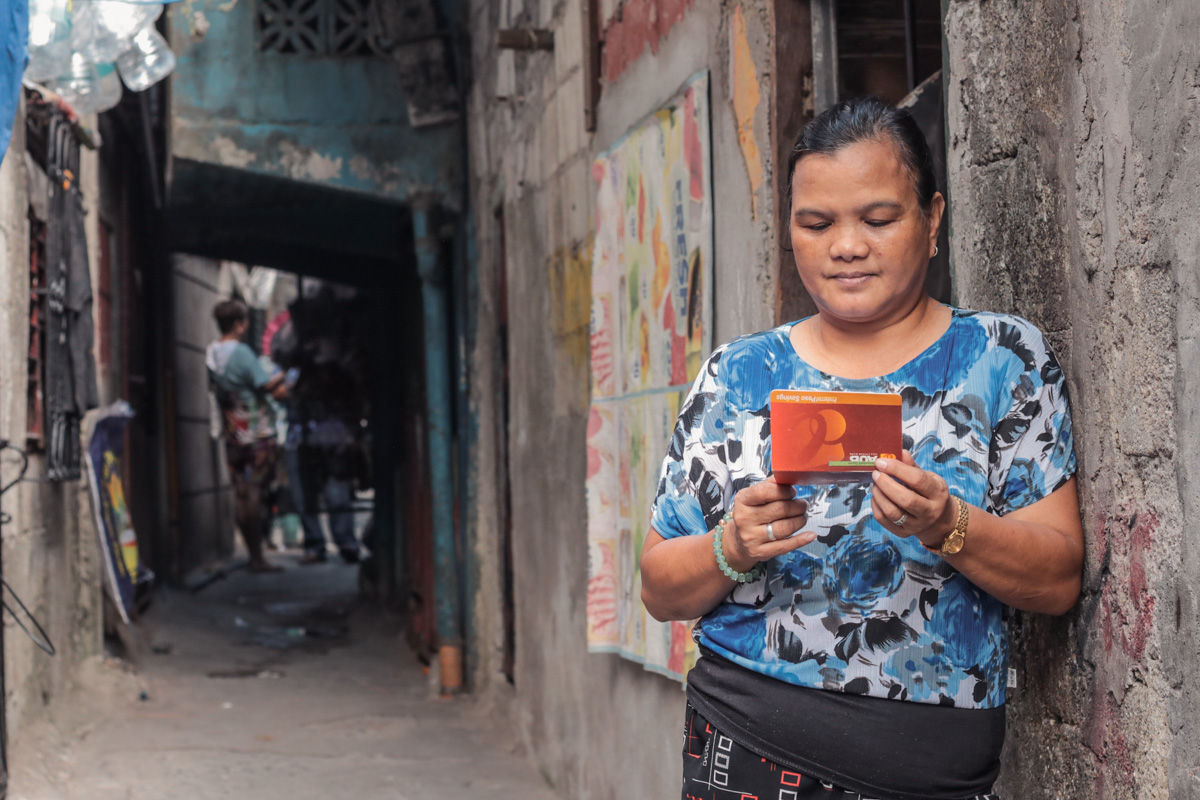
Elvira, the mother of a sponsored child in the Philippines, learned to record and track her child’s monthly direct cash benefit in a booklet. One of the largest challenges facing Unbound Philippines staff when the organization implemented the cash transfer method was that many families had never had official bank accounts and didn’t possess the documentation needed to open them.
Before cash transfers, sponsorship benefits were delivered to families through more traditional means — such as groceries, school supplies, clothing and other necessities — and while families had a voice in selecting benefits, there was a desire to consider on a deeper level the personal nature of each family’s poverty.
The focus began to shift to how a family’s sponsorship benefit, when connected to goals, could encourage deeper discipline in combining all their financial resources to reach those goals.
“We moved to cash transfers because we had a certain level of trust in the families we served, but it was still a leap of faith to some extent,” said Pearson, who leads Unbound’s International Programs Department in monitoring the effectiveness and fiscal credibility of the organization’s programs across three regions of the world.
However, donors and supporters of poverty-reduction programs often have as many misconceptions about cash transfers as they do about the individuals who live in poverty.
In a survey of over 700 U.S. donors in 2024, nonprofit GiveDirectly found that while 80% of respondents were at least somewhat aware of the issue of extreme poverty, they ranked “direct cash assistance” as their least popular way to help people in poverty. Their biggest concern about direct giving was that they thought recipients would misuse the money.
GiveDirectly has delivered cash directly into the hands of over 1.7 million people living in poverty globally. Its research has found that recipients spend the money in “impactful and creative ways.”
Unbound’s own experience with cash transfers, as well as listening to the stories of the families, has revealed similar outcomes.
Pearson said the cash transfer method has taken the organization to a “much deeper level of trust in families,” as it opened new ways for them to “demonstrate their ingenuity and commitment to their personal goals.”
“Each brave local program team that handed financial decision-making power to families was another challenge to the myth that families living in poverty could not be trusted to manage money,” said Pearson.
The impact of cash transfers on the lives of Unbound’s program beneficiaries has been profound. Positive improvements have been noted in the areas of food and housing security, educational attainment, women’s and mother’s empowerment and family savings, among others.
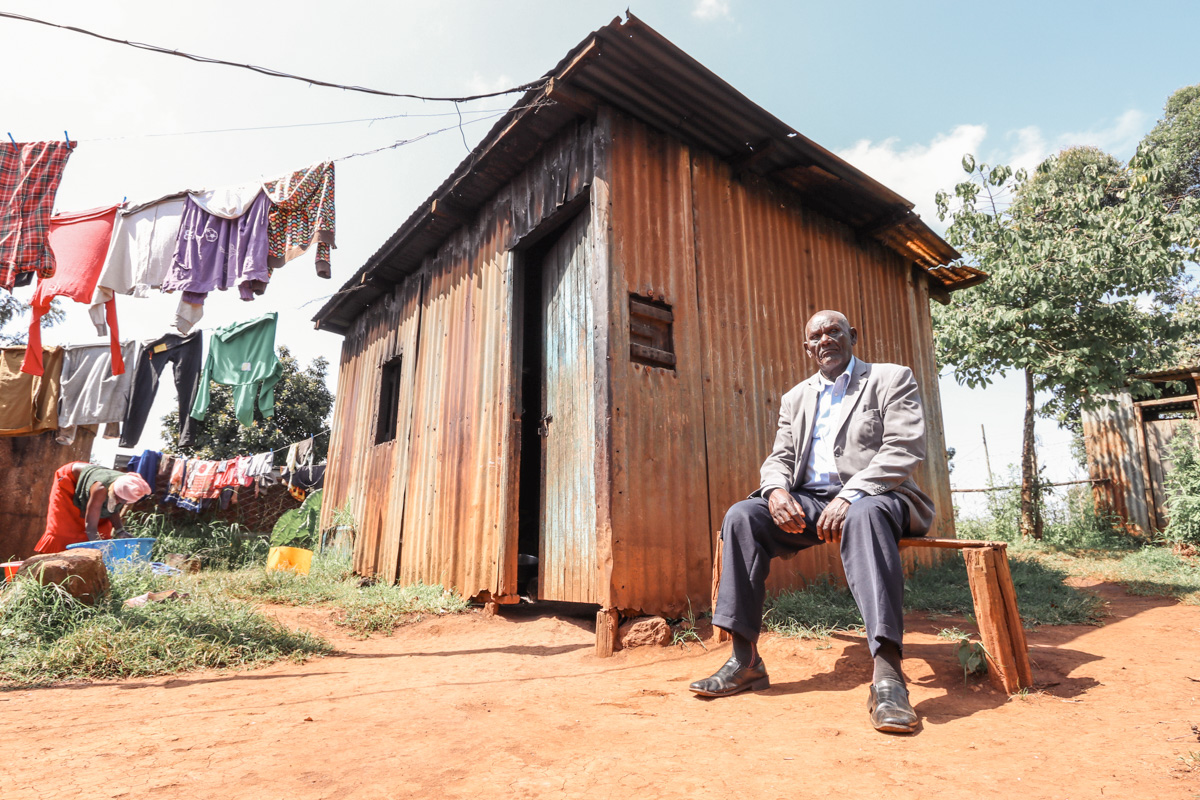
David, a 78-year-old sponsored elder in Kenya, used all his retirement savings caring for and educating his children and grandchildren. Sponsorship in 2015 gave him new hope and ideas. He invested his sponsorship benefit to start a small business selling spices and handwoven shopping bags. Overtime, he built a loyal clientele and is generating an income that will sustain his family well into the future.
How cash transfers help each family address their unique situations
Poverty to me is not having knowledge.
— Amelia, Mother of sponsored child in Peru
When the sponsorship benefit is placed directly in the hands of families in poverty and its use is aligned with predetermined goals and strategic guidance, the result is that those families begin to move down a path free from poverty.
Using Unbound’s Goal Orientation powered by Poverty Stoplight, families can see a clear picture of how to improve their situations, what goals need to be set and in what ways they can use their sponsorship benefit to help them achieve those goals.
In Guatemala in 2023, Débora and her sponsored son Hamilton, 17, took the Poverty Stoplight survey and realized that to begin moving beyond poverty, they needed to focus some attention to acquiring their own housing. For financial reasons, the pair shared a home with Débora’s parents.
With a plan made to reach her first goal, Débora and Hamilton began saving to build a house. For a year, they saved parts of the sponsorship benefit along with parts of their daily income. In late 2024, the family built and moved into their first home. The small two-room house doesn’t yet have a fully functioning kitchen, but that’s another goal Débora plans to work on.
“I think Poverty Stoplight is a tool that shows us where we’re stuck and where we’re settling,” Débora said. “We have the future to think about, not just the present. We don’t have to be complacent and just stick with what Unbound gives us. With that money, we can generate income, too.”
And Débora did just that. After receiving training from Unbound staff on how to invest the monthly sponsorship contribution, she purchased and began raising chickens to butcher and sell the meat. The profits earned from their small poultry business now cover household expenses and go into savings for future needs.
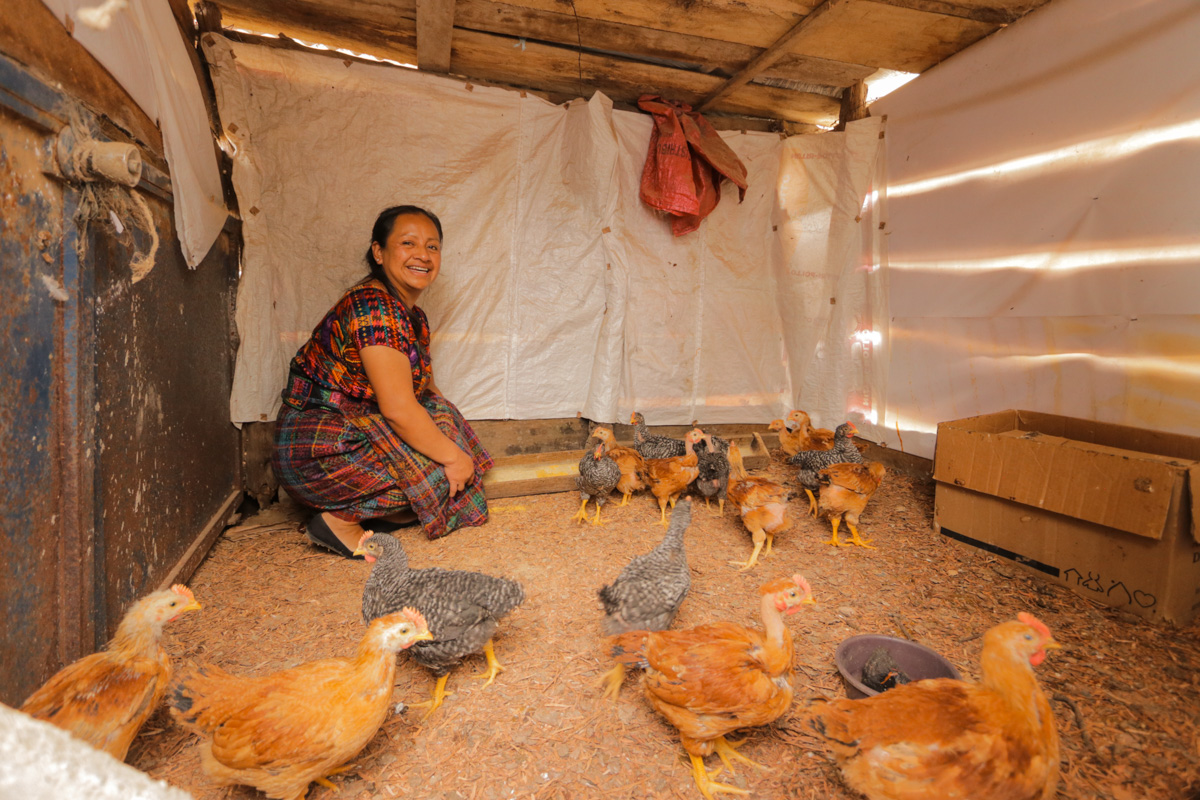
Débora first purchased 12 chickens with part of her son Hamilton’s sponsorship benefit. With the profits, she invested in more chickens, and the family’s poultry meat business took off.
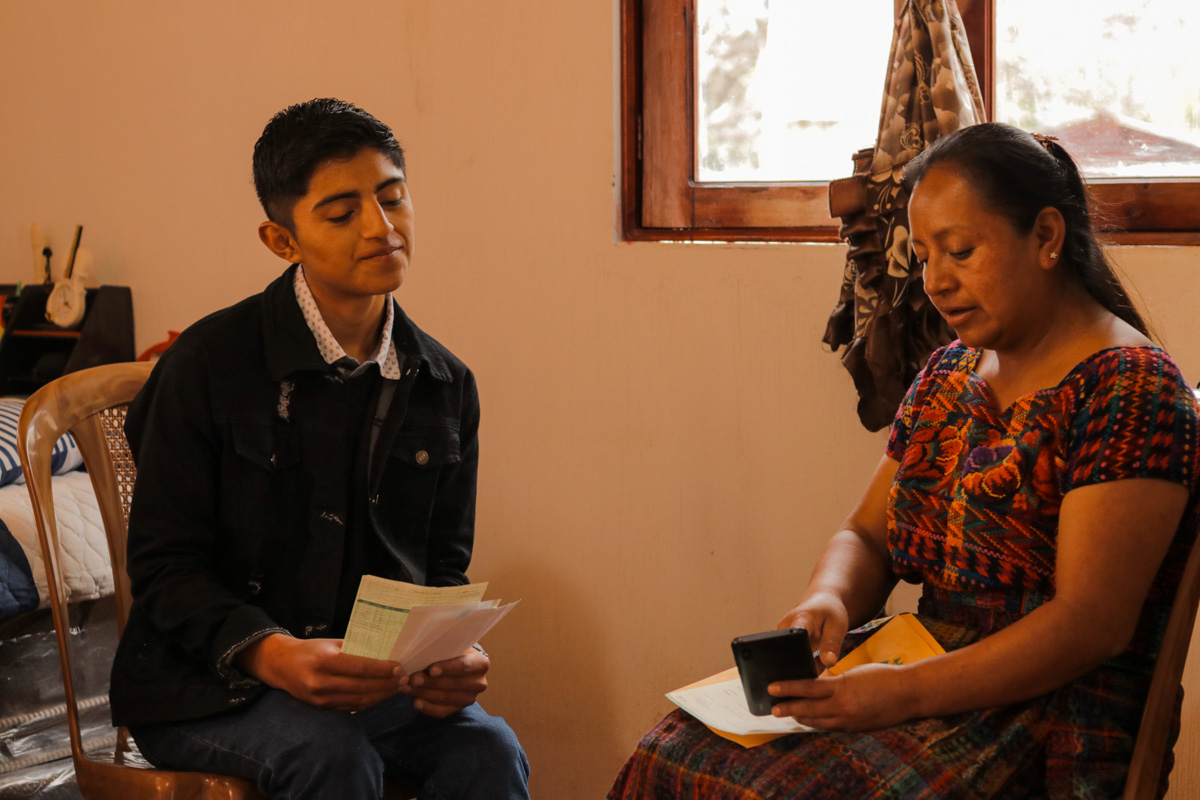
Sponsored youth Hamilton, 17, actively helps his mother manage his sponsorship benefit, the largest portion of which is set aside for his education. The experience has helped Hamilton learn how to manage a budget and a business from a young age and has influenced his desire to one day be an entrepreneur.
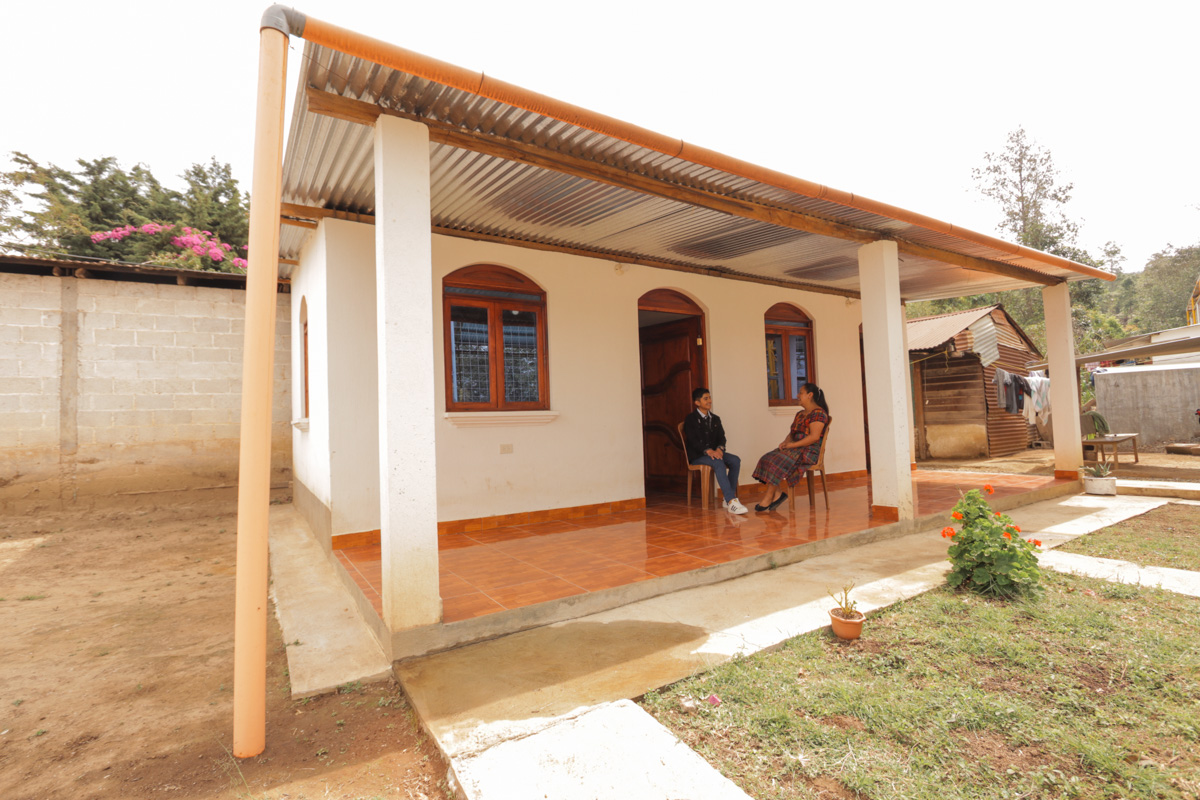
Débora and Hamilton sit on the porch of their new two-room home they built in Guatemala using saving strategies encouraged through Unbound.
Andrés González Peneleu, director of program evaluation in Unbound’s Guatemala office, said evaluations of families since using cash transfers show their investment perspectives have changed significantly. Local staff used to purchase food and other products with sponsorship funds to hand deliver monthly to sponsored children.
During that time, Peneleu said families mostly asked that their sponsorship benefit go to the purchase of food.
“Now, they say, ‘I’m going to save,’” Peneleu said. “That was a huge change because the need for food hasn’t stopped; it continues, daily. But by having the fund in hand, they’ve made most of the decisions to save if they can cover their needs with other income.”
According to Peneleu more than 73% of families in Guatemala receiving their benefits via cash transfer either invest those funds into education for their children or put them into savings. Though families have no requirements on how to spend their funds, the organization does require sponsored children to go to school. Education is often a great motivator.
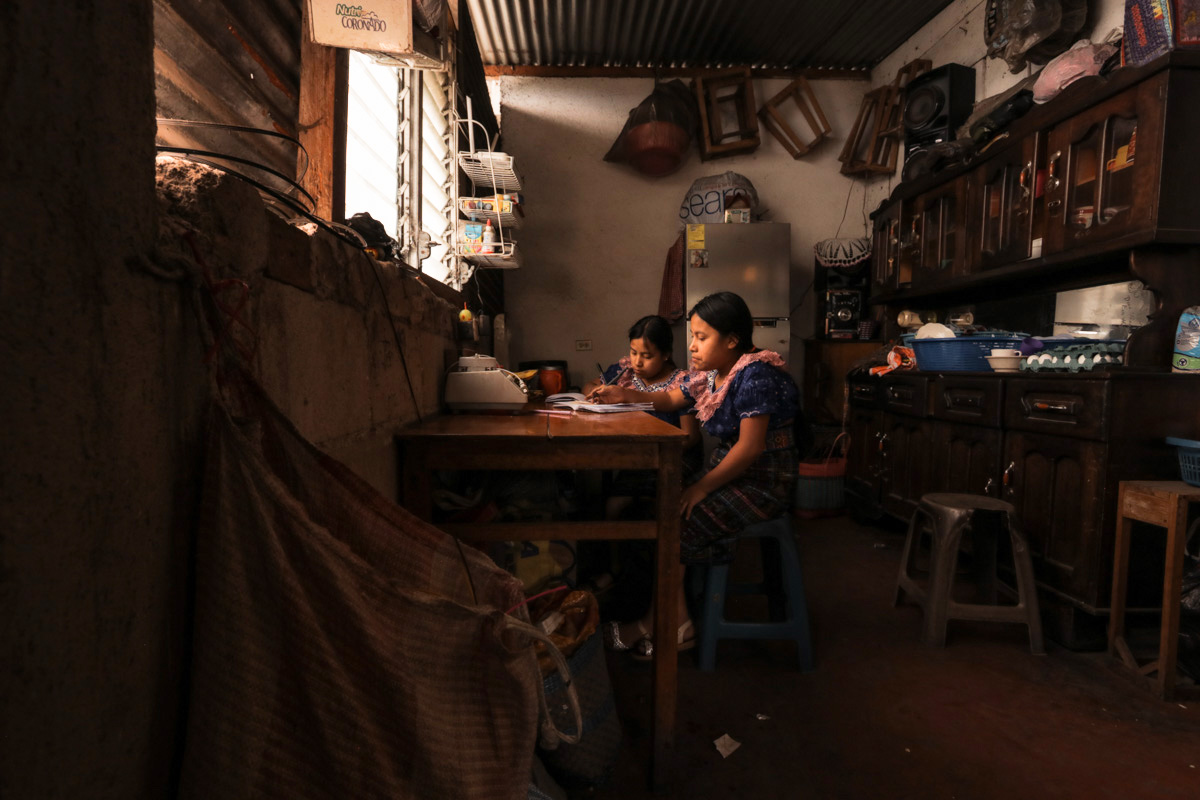
Sponsored twins Luisa and Dulce, 12, complete their homework in the kitchen of their family’s home in Guatemala. With assistance from the sponsorship benefit, 100% of sponsored children in Unbound’s programs have the opportunity for an education.
In Unbound’s Santa Ana program in El Salvador, Gloria’s son Omar has been sponsored for more than 10 years. Gloria earns income from working various informal jobs and operating two small businesses where she sells secondhand clothes and homemade pickled cabbage.
She remembers Omar receiving his sponsorship benefits in the form of footwear, school supplies and food when he was a child and how the family’s priorities shifted once Unbound began using the direct cash transfer model, putting the decisions fully in their hands.
“There is a big difference in someone saying to you, ‘I’m going to give you this apple; eat it,’ and then being told, ‘Now, you decide what you want to eat,’” said Gloria, comparing the differences. “We learned how to identify priorities. We [learned] that it is not difficult to [reach] goals, we just have to yearn.”
Gloria yearned for her children to have the opportunity for education and to one day be professionals — opportunities she never had.
She set academic goals for Omar to reach. Now at 20 years old, Omar has earned a certificate that allows him to offer his services as a photography technician. An Unbound scholarship recipient (scholarship funds are also delivered via cash transfer), Omar has just begun his first year of college.
“We think that the best legacy that can be left to a child is not material possessions, but that they have a way to get ahead without depending on anyone,” Gloria said. “In this case, a job through which they can have a decent salary and a dignified life.”
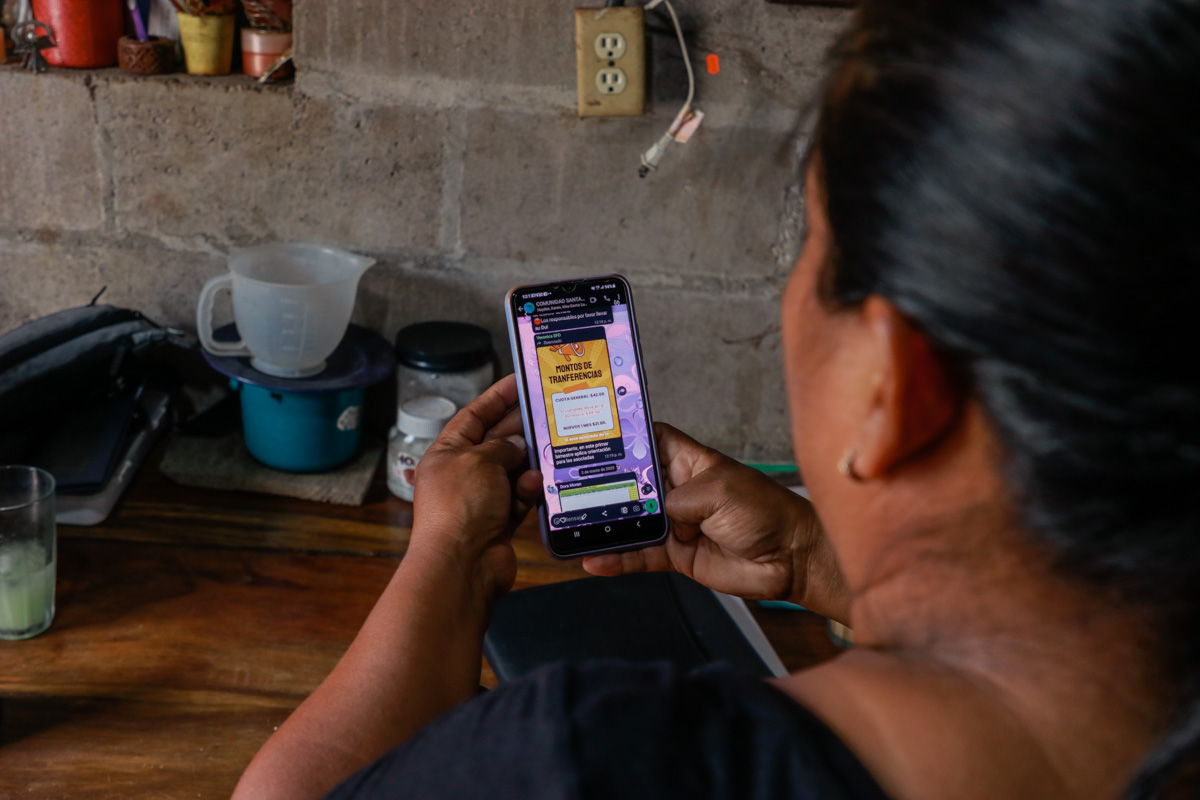
Gloria checks her son Omar’s cash-transfer benefit deposit via a mobile app. For banking, Gloria often must travel an hour-and-a-half from her rural community in El Salvador to make a withdrawal.
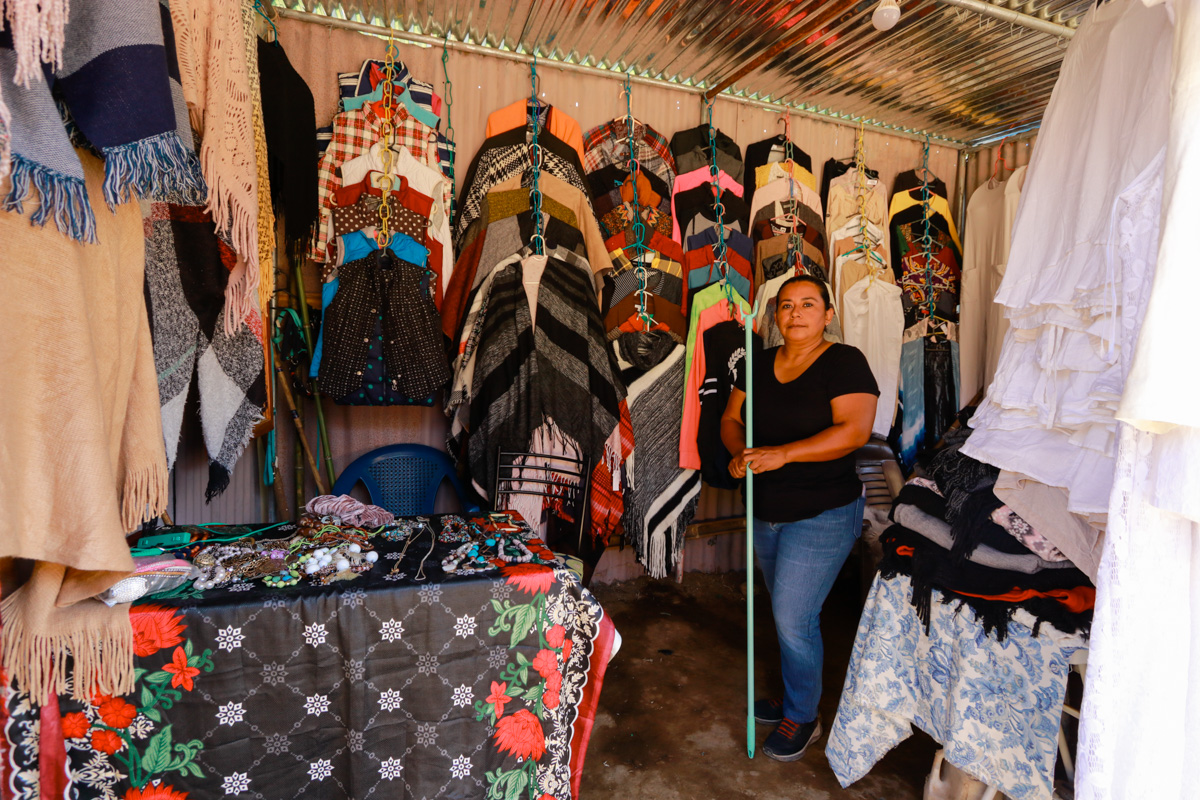
With her son’s educational attainment assured, Gloria leveraged her family’s savings, including some of the sponsorship benefit, to develop several successful small business initiatives that are helping her family reach their goals.
In the Journal of the American Academy of Child and Adolescent Psychiatry, a 2024 article comparing the impact of cash transfers on people in poverty around the world found that critics of the cash transfer methodology are increasingly being proven wrong in their preconceived notions about people in poverty. The study found that recipient families tend to invest in the supports their children need to thrive.
Who better knows what their families need than mothers? Unbound empowers women and mothers with financial inclusion under the belief that empowered mothers empower their families to rise above poverty.
“We observed the expertise of so many mothers who were helping their children thrive on the most limited budgets,” Pearson said. “That convinced us that they were the real experts in the most efficient use of resources intended to help their families.”
In Unbound’s programs globally, the cash transfer benefit largely goes to women’s accounts on behalf of their households, and they set short and long-term family goals.
In Nairobi, Kenya, Florah, a mother of five, including sponsored son Jonas, was empowered through sponsorship to improve her family’s living situation for the safety of her children. The family raises livestock in a rural indigenous Maasai community and lives in a house with no electricity or indoor kitchen.
To illuminate their house in the dark, the family was using a kerosene lamp with a handheld torch. To boil water for bathing or tea, the family used a pit fire that could be dangerous to tend at night. After taking the Poverty Stoplight survey, Florah realized these deprivations were keeping her family from moving forward. With savings accumulated over time, she purchased three solar lights for the house so her children could complete their homework at night, and a clean-burning stove that could be used indoors.
Florah has also been able to stretch the sponsorship benefit to pay for schooling not only for her sponsored son Jonas, but one of his other three siblings as well.
Unbound Nairobi program social worker Rachael Muthoni said families in rural areas receiving the cash transfer can access commodities in their local communities at their convenience. Many families purchase solar panels to light their homes, water tanks for storing clean water and furniture items made of more sustainable materials, such as beds for their children.
“Some families with longer-term goals have been able to purchase their own land, stop renting or living in slum areas, and move into their own homes,” Muthoni said. “Our families are diverse, and each has different goals and plans for how to better their lives.”
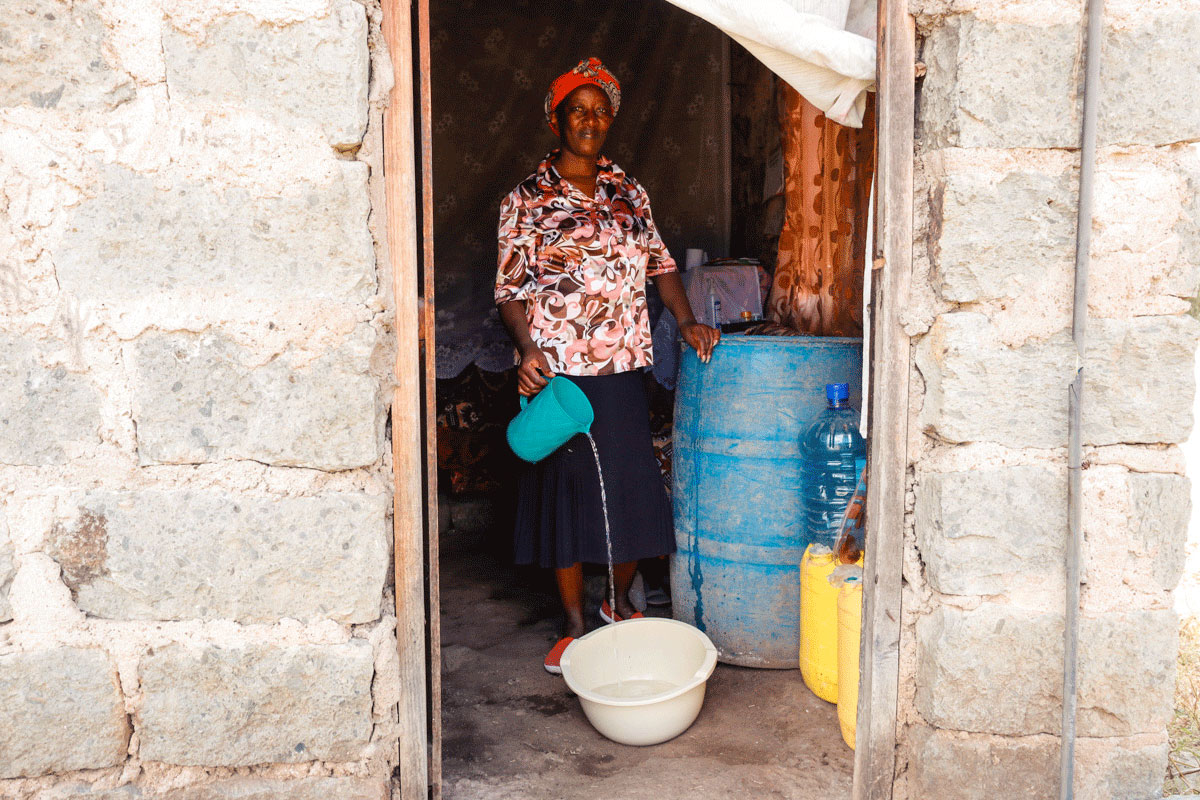
In Nairobi, Kenya, Caroline and her family were living “hand to mouth” each day, as she describes it, and when her son was in an accident, his medical needs set them back. She had never had money to save in a bank account until her son was sponsored and began receiving his benefits via cash transfers. With training and goal setting, now Caroline has developed a saving and budgeting plan and has been able to acquire health insurance for her family.
Eliminating poverty: A goal 'destined for an end'
Let's consider life as a forest full of bush thorns. You're passing through that forest, and you don't have any tools to move the bush thorns. That's how poverty is; that's how it feels. It makes you cry every day, every night. Cry. Even if you can't show tears, inside there are tears.
— Joseph, Father of a sponsored child in Rwanda
Use of direct cash transfers at large scale at Unbound has had an added benefit for families in its sponsorship programs, as local staff have more time to dedicate to building deeper relationships with those they serve.
“The work of Unbound’s [local staff] could shift from overseeing the purchase and delivery of tangible benefits to full-time focus on delivering intangible benefits,” said Pearson, who believes the cash transfer method should be the “gold standard” for development work.
Intangible benefits include things like counseling, training, savings and loan guidance, peer support group participation, and building self-esteem and community.
In Guatemala, Peneleu said with the introduction of cash transfers, staff now have a greater presence in the field and are more familiar with the realities families face.
“There’s much more personalized attention to each family, to listen to them and motivate them on their journey,” Peneleu said. “We thought poverty was more tangible before, but we’ve learned that self-esteem and emotional [frame of mind] are part of multidimensional poverty. [Knowing] these kinds of indicators now can truly help us [eliminate] poverty.”
To redefine the way the world views poverty, staff discovered that they also needed to help the very people in poverty define it from their own experience. Establishing strong support networks for parents, guardians and elders in Unbound’s programs is one of the most direct ways that local teams empower individuals to articulate their own concept of what poverty is and their roles in challenging it.
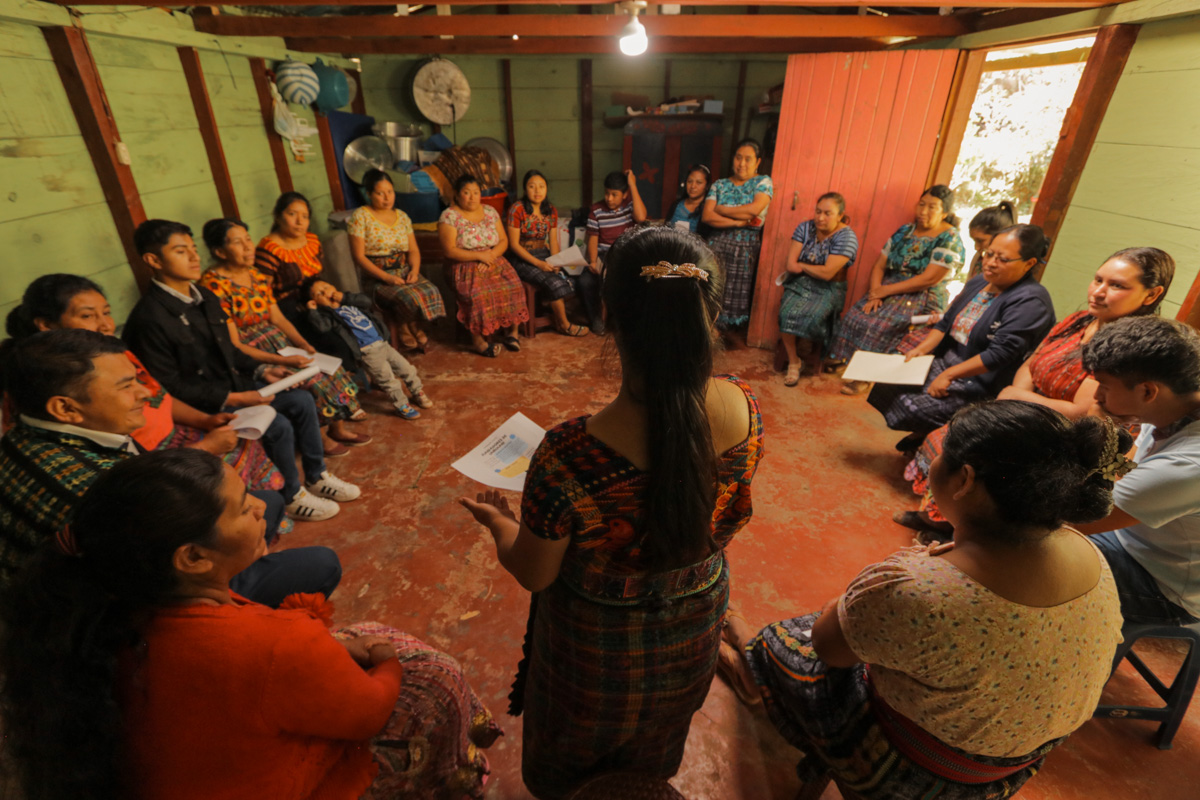
A group of mothers gather for their monthly meeting in Unbound’s Guatemala program.
In particular, mothers groups speak to the emotional deprivations experienced by those living in poverty, empowering them to acknowledge and embrace their leadership potential, overcome their fears and build their self-esteem — all things that give them the confidence to make the decisions that drive lasting change within their families and the larger community.
“[These aspects] help them realize their reality, that perhaps they are economically poor, but they are not poor in their innermost thoughts and motivations,” Peneleu said.
Marilin Magaña, subproject manager with Unbound El Salvador, said staff were apprehensive in the beginning about switching the delivery of benefits to cash transfers, but it didn’t take long for them to realize it was an unnecessary fear. Today, staff teams spend more time teaching families financial literacy and the importance of having short- and long-term goals that can change their ways of life.
“Today, they are the ones visualizing their priorities and choosing how to direct their funds,” Magaña said. “And they know that these funds are going to help them achieve a dream, to achieve a goal that has already been destined for an end.”
To eradicate poverty from our world is to achieve a goal that has also already been “destined for an end.” With a decentralized approach that puts trust and the right resources in the hands of those closest to the issue, this goal can be realized sooner rather than later.
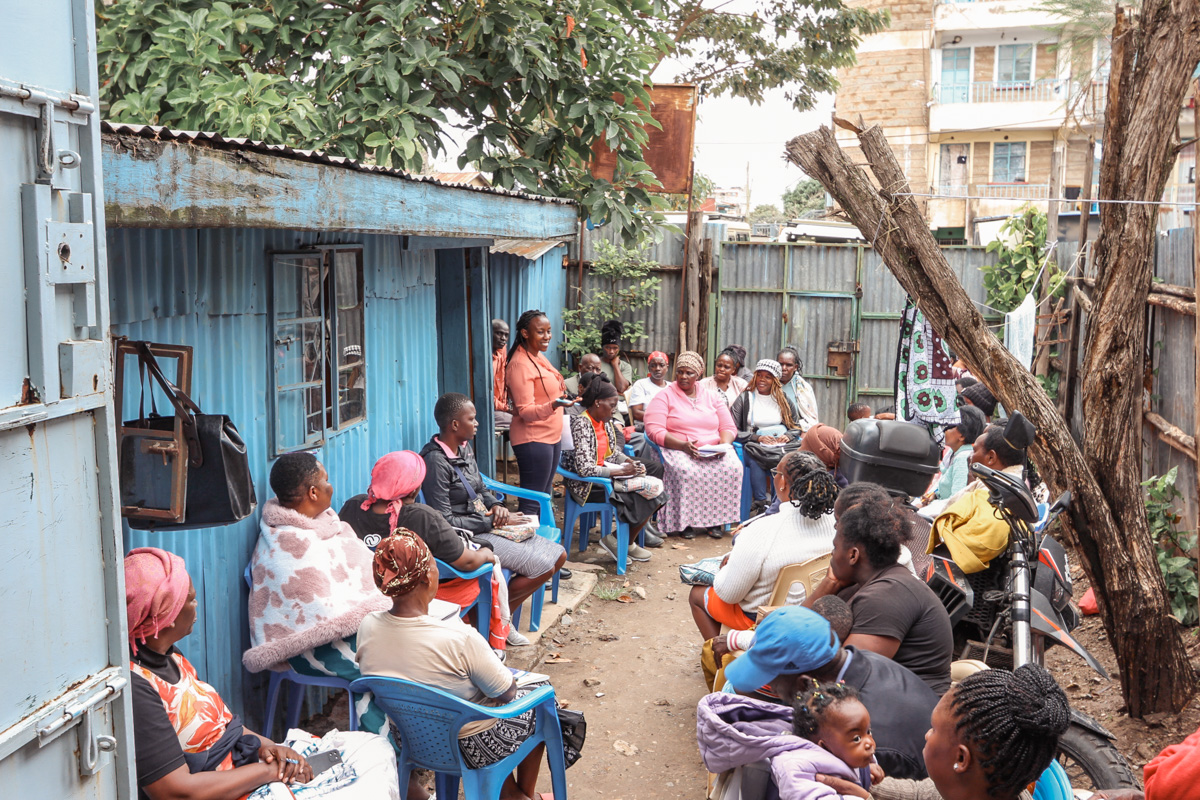
Rachael Muthoni, Unbound Nairobi social worker, addresses a mothers group gathered for a training session.
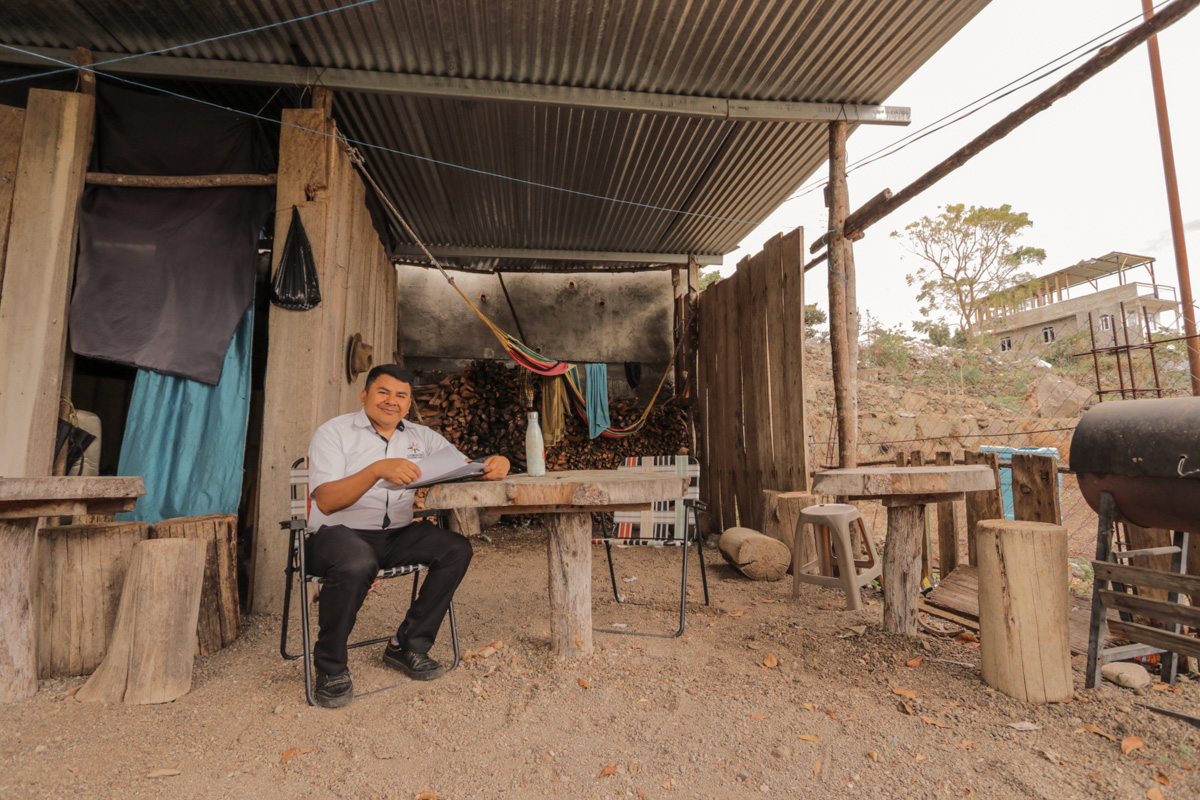
Unbound Guatemala Director of Program Evaluation Andrés González Peneleu gets set up at the home of a family to check in about their progress with Poverty Stoplight goals.
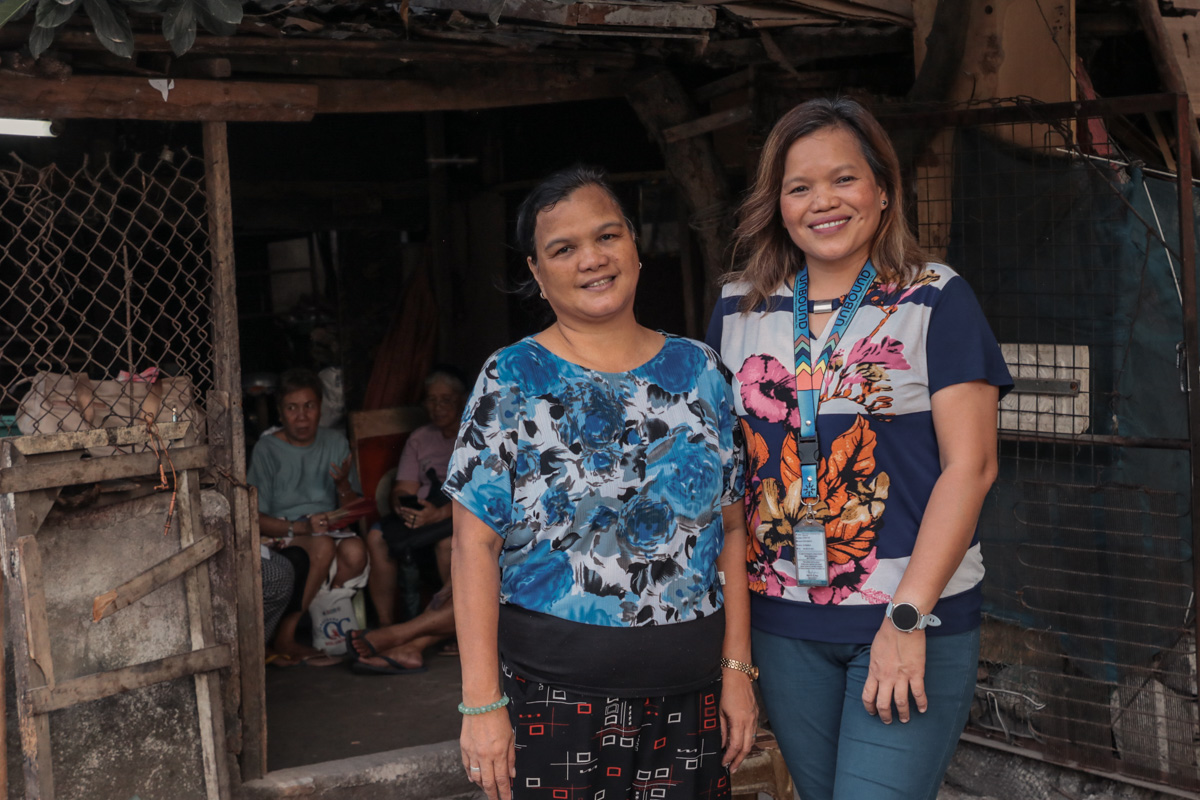
Nona Salamanque (right), a staff member of Unbound’s Quezon program in the Philippines, offers her support to mother leader Elvira at a monthly mothers group meeting.
Learn more about Unbound’s decentralized approach and how we work to reach our goal to eliminate poverty through our 2030 strategic plan. Be a part of putting decisions in the hands of individuals and families living in poverty when you sponsor a child or elder today.
Each brave local program team that handed financial decision-making power to families was another challenge to the myth that families living in poverty could not be trusted to manage money.
— Dan Pearson, Unbound Chief International Program Officer
Unbound Regional Reporters Nickson Ateku, Oscar Tuch, Josue Sermeno and Teejay Cabrera contributed information and photos for this story.